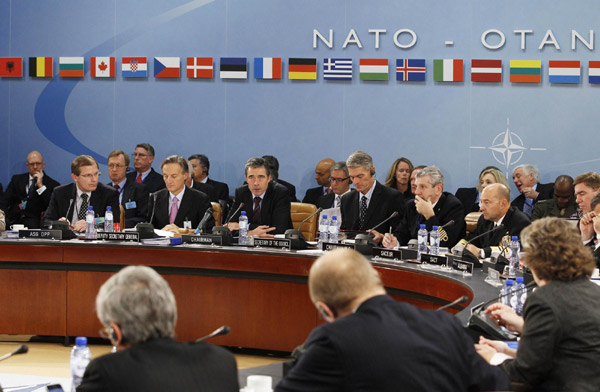Global General
NATO chief calls for anti-missile system
(Agencies)
Updated: 2010-10-14 22:44
 |
Large Medium Small |
|
 NATO Secretary General Anders Fogh Rasmussen (C) delivers a speech during the opening session of a NATO defence ministers meeting (NAC) at the Alliance headquarters in Brussels October 14, 2010. [Photo/Agencies] |
BRUSSELS - NATO's secretary general urged member states on Thursday to endorse a proposed anti-missile system that would protect Europe and North America, saying that is the alliance's responsibility.
Anders Fogh Rasmussen said NATO's new mission statement - expected to be adopted at a summit of alliance leaders next month in Portugal - would focus on streamlining and reforming the organization to deal with emerging threats.
| ||||
NATO is proposing to expand an existing system of battlefield missile defense to cover the territory of all alliance members against ballistic missiles.
"The threat is clear, the capability exist and the costs are manageable," Fogh Rasmussen said in his opening remarks.
"Starting today, NATO is in the sprint to the summit," he said. "The decisions we take in the next two weeks will shape the future of the world's most successful alliance."
The United States supports the missile defense proposal. But some governments have taken a dim view of a proposed shield, citing high costs and saying the system cannot accomplish the role of a robust nuclear deterrent.
"We think missile defense is basically a good idea, but we also believe that matters like arms control should be and will be an important component," German Defense Minister Karl-Theodor zu Guttenberg said.
Fogh Rasmussen's proposed system would integrate battlefield missile defense networks already in use in the US and some other allied nations to provide basic coverage from attack by ballistic missiles.
At an estimated cost of euro200 million ($279 million), it is much cheaper but also less capable than a dedicated anti-missile system proposed by the Bush administration, which caused a deep rift with Russia. Moscow opposed the stationing of powerful radars and anti-missile batteries near its western borders.
US Secretary of State Hillary Clinton welcomed the draft of the new mission statement, saying it strikes a balance between the various security needs.
Clinton came out against proposals to remove the alliance's remaining 200 tactical nuclear weapons from Europe, saying that NATO must remain a nuclear alliance as long as nuclear weapons exist.
"I would add that decisions on NATO nuclear posture and policy must be made by consensus, not by any ally unilaterally," she said, in apparent reference to calls from several nations, including Germany, for the removal of battlefield nuclear weapons from the continent.
Clinton also welcomed Fogh Rasmussen's emphasis on a constructive partnership with Moscow to address joint security challenges, saying that "we will work with Russia to make the world safer."



